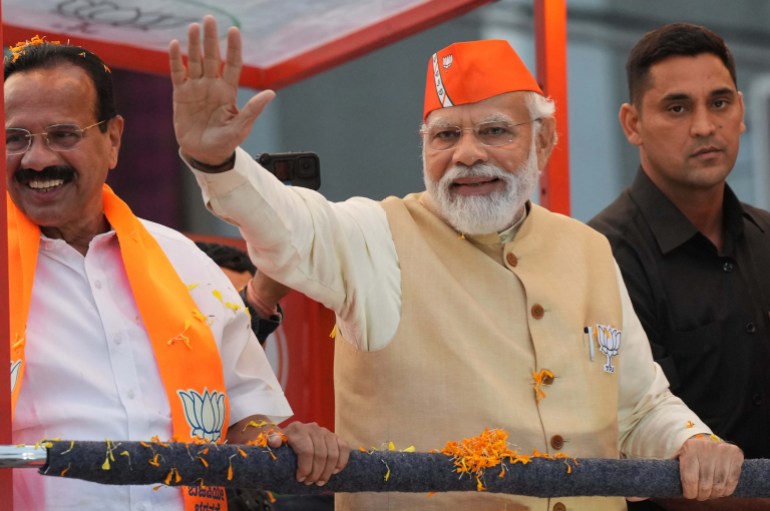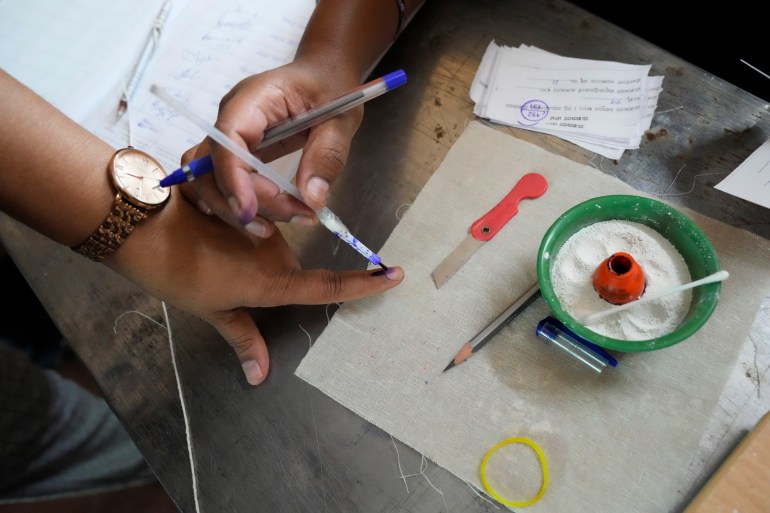India’s Karnataka state votes in crucial challenge to ruling BJP
The outcome is likely to be an indicator of voter sentiment ahead of national elections expected by May next year.

People in the southern Indian state of Karnataka are voting in an election where pre-poll surveys show the opposition Congress party favoured over Prime Minister Narendra Modi’s governing Hindu nationalist party.
Wednesday’s votes for 224 state legislature seats will be counted on May 13 and the outcome is likely to be an indicator of voter sentiment ahead of national elections expected by May next year.
Keep reading
list of 4 itemsWhy coastal Karnataka is southern India’s ‘Hindutva laboratory’
India court upholds Karnataka state’s ban on hijab in class
Christians on edge in India’s Karnataka ruled by Modi’s BJP
Bengaluru, the state capital, is India’s information technology hub and the area is a sought-after workplace for young professionals.
Modi’s Bharatiya Janata Party (BJP) is battling to retain the only southern state where it has ever won. BJP strongholds are in northern, central and western India, while opposition parties rule the other southern states of Kerala, Tamil Nadu, Andhra Pradesh and Telangana.

The BJP has been accused of running a polarising campaign to limit its losses due to anti-incumbency, inflation, allegations of corruption and poor infrastructure development in the state.
A Narayana, a political analyst, said there is voters’ anger against the BJP government in the state.
“If this anger somehow translates into voting, the BJP has reasons to worry and the Congress has reasons to rejoice,” he said.
Sandeep Shastri, another expert, said the situation seems to be like that. “The Congress has its nose ahead.”
A BJP win would put top Congress figure Rahul Gandhi’s popularity in question. If Congress prevails, the credit will go to Gandhi’s crucial campaigning for his party in Karnataka.

In the 2018 assembly elections, the BJP emerged as the single-largest party with 104 seats, followed by the Congress with 78 seats and the Janata Dal (Secular) with 37. The BJP formed the government 15 months after defecting legislators from other parties joined it.
The party is battling a dent in its image caused by the suicide of a government contractor earlier this year and the arrest of a legislator who was caught accepting bribes.
The Congress has built its campaign around the Karnataka Contractors’ Association’s accusation that BJP ministers and officials demand a 40 percent commission or a bribe for every project sanctioned by the government. The BJP leaders deny the accusation.

Karnataka, with a population of 61 million, has strong caste-based voting patterns. The dominant Lingayat community comprises 17 percent of the population and influences the outcome in nearly 100 seats. It is the stronghold of key BJP leaders who belong to the community.
The BJP is banking on its ties with powerful religious institutions followed by different castes and communities like Lingayats, Vokkaligas, Kurubas, Valmikis, Nayakas and Madiga.
It is also trying to maximise gains in a coastal region where religious polarisation between majority Hindus and minority Muslims has deepened due to a row over wearing the hijab (headscarf).
Last year, a government-run school in Karnataka’s Udupi district barred students wearing hijabs from entering classrooms, triggering protests by Muslims who said they were being deprived of rights to education and religion.
That led to counterprotests by Hindu students wearing saffron shawls, a colour closely associated with that religion and favoured by Hindu nationalists.
An Indian court later upheld the ban on wearing hijab in class in the state saying the headscarf is not an essential religious practice of Islam.
According to the 2011 census, India’s most recent, 84 percent of Karnataka’s people were Hindu, almost 13 percent Muslim and less than 2 percent Christian.